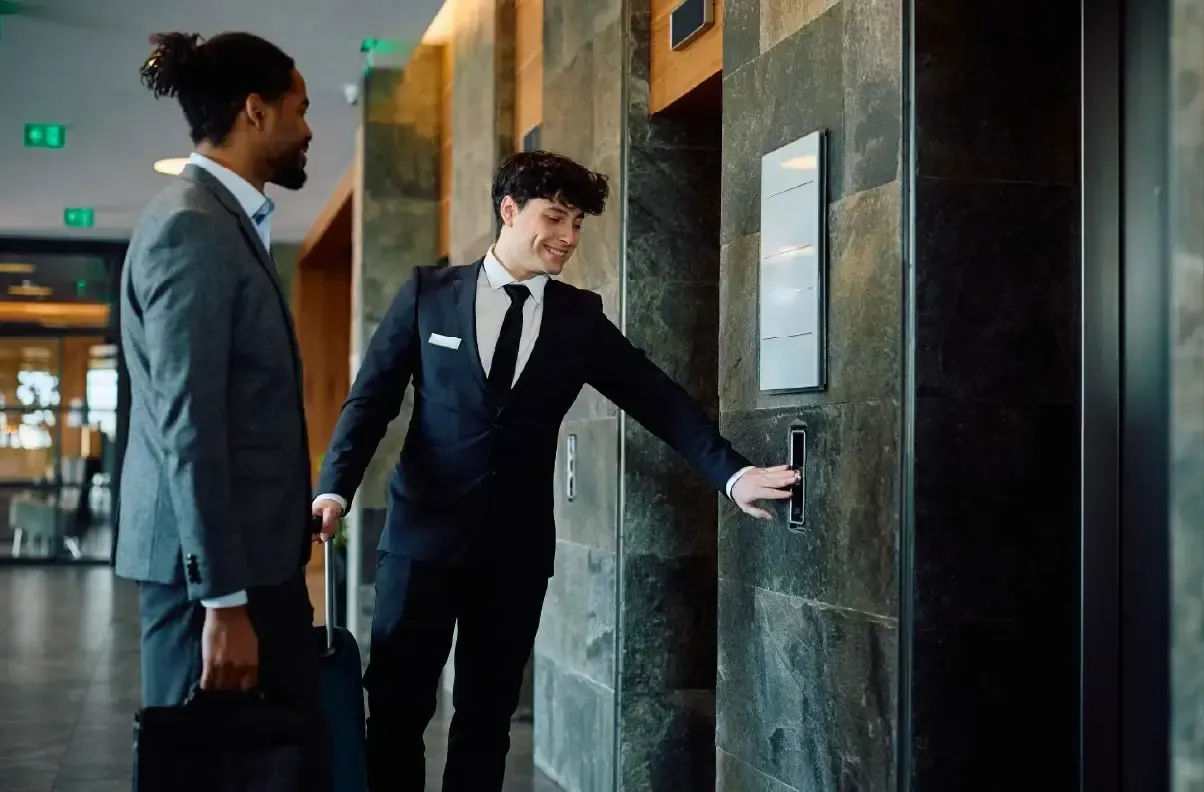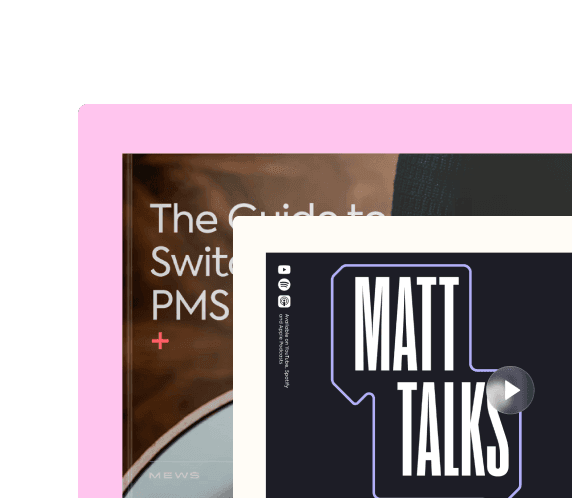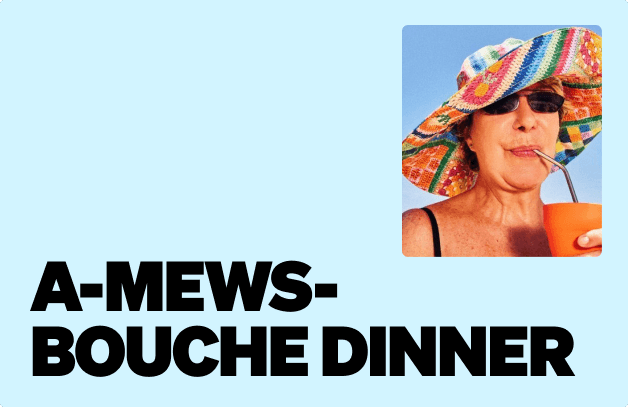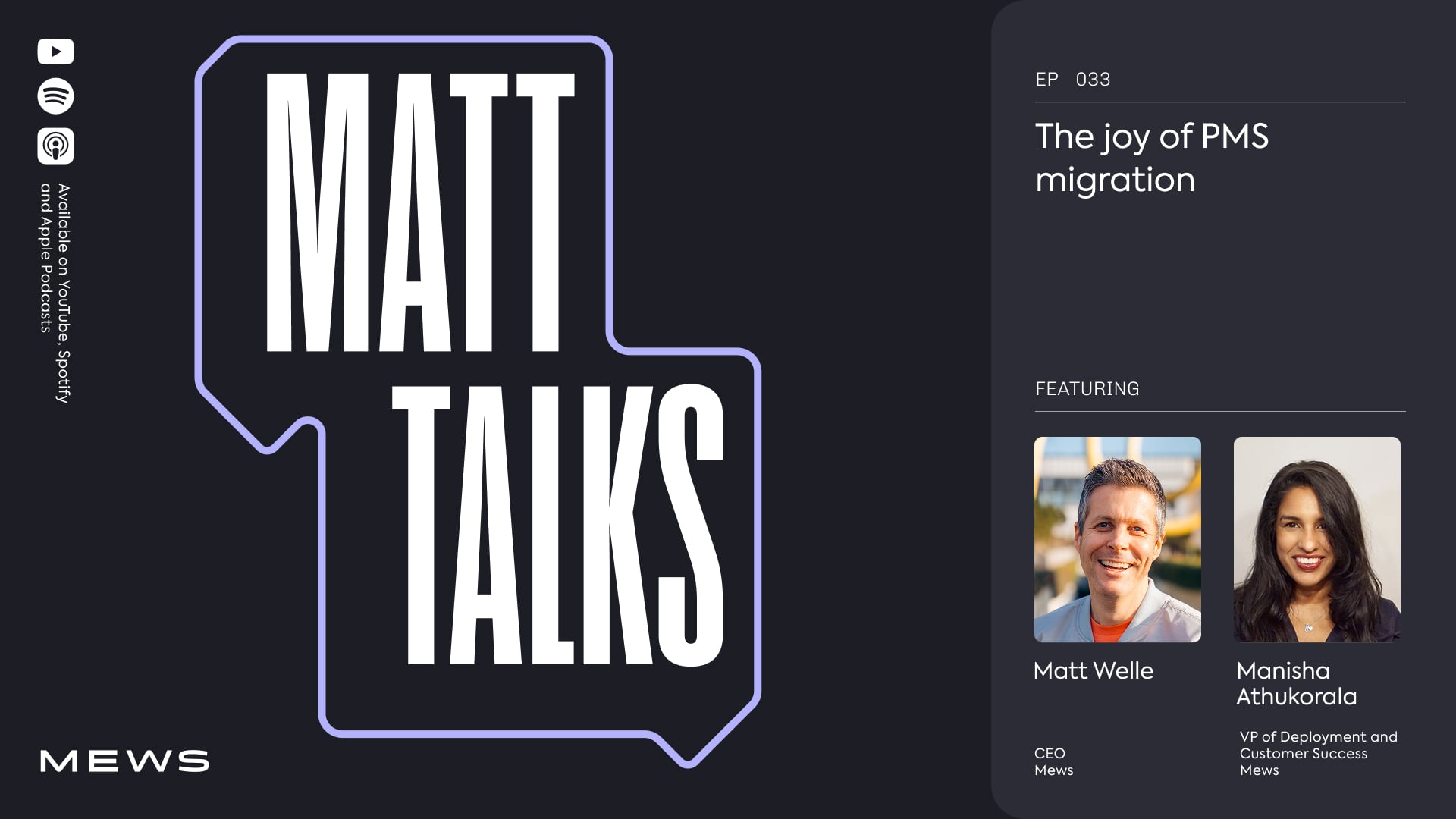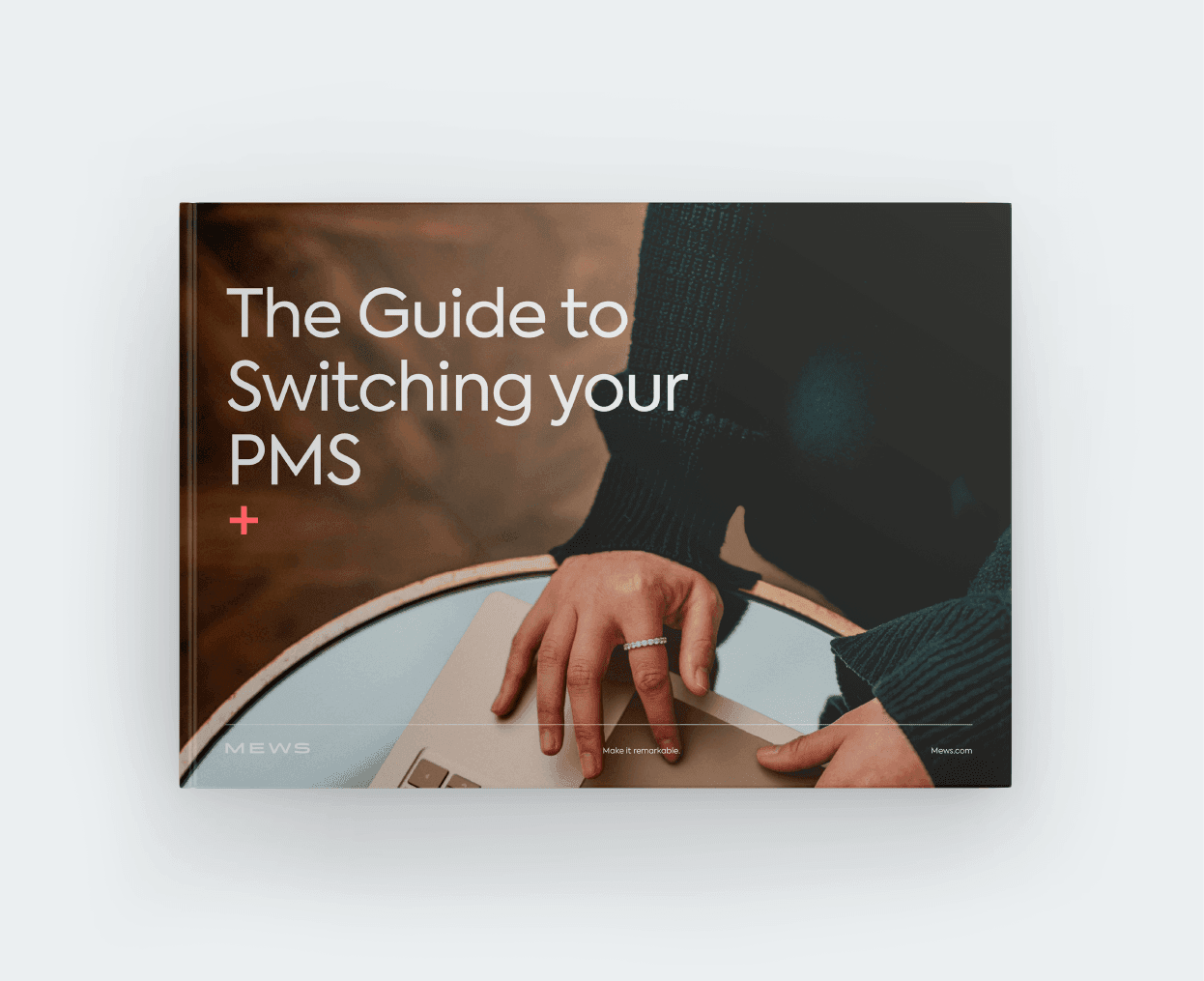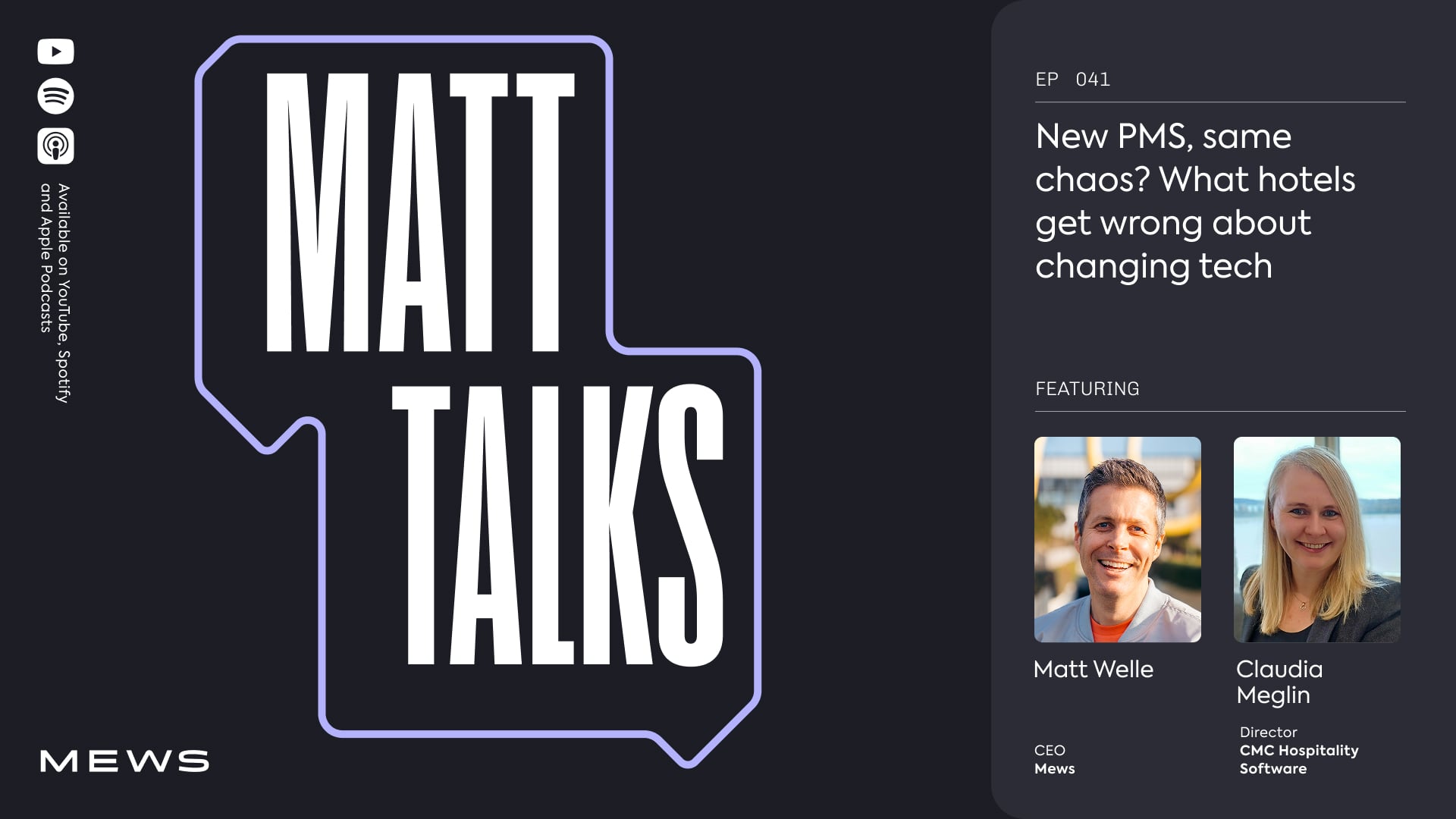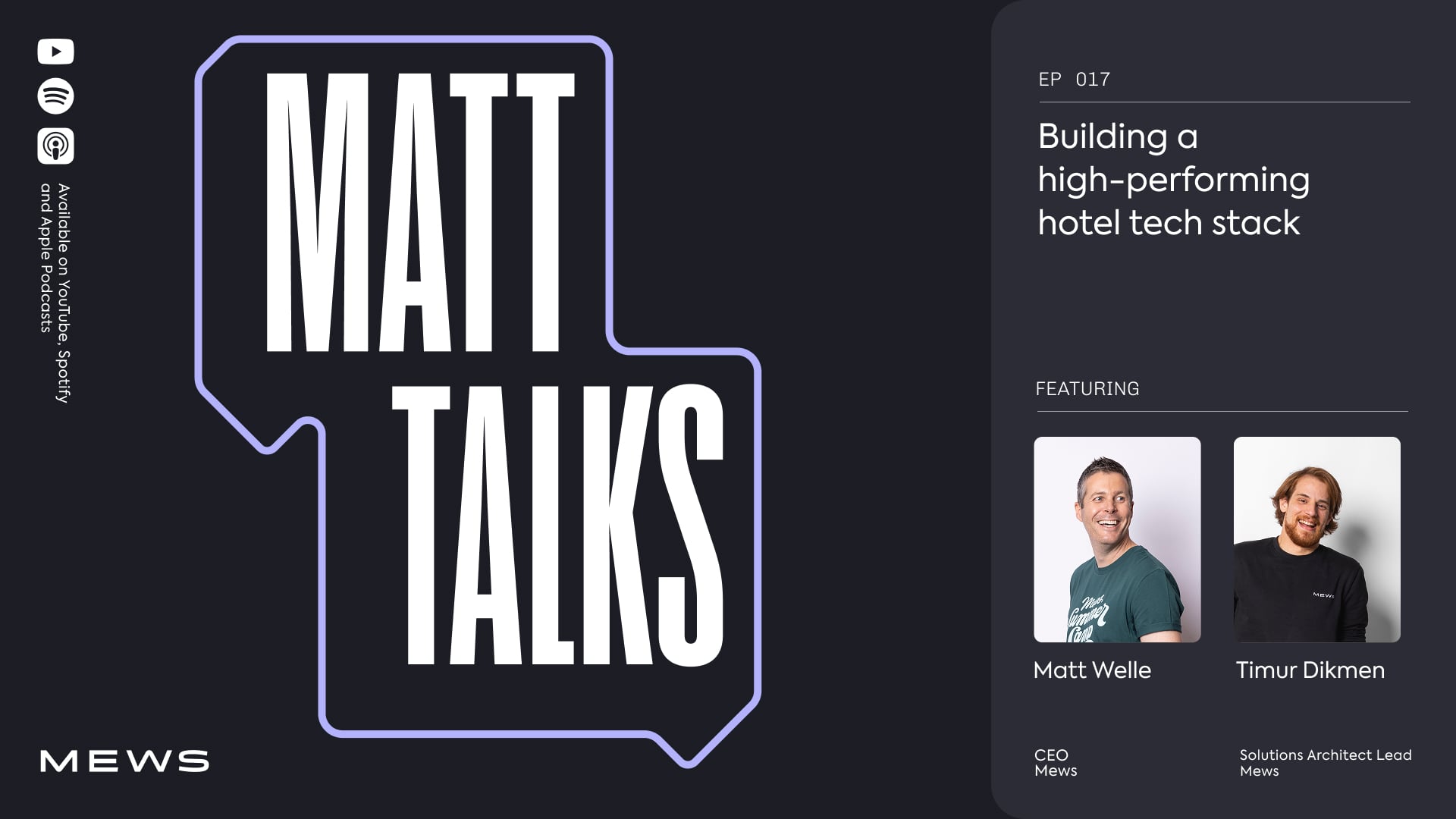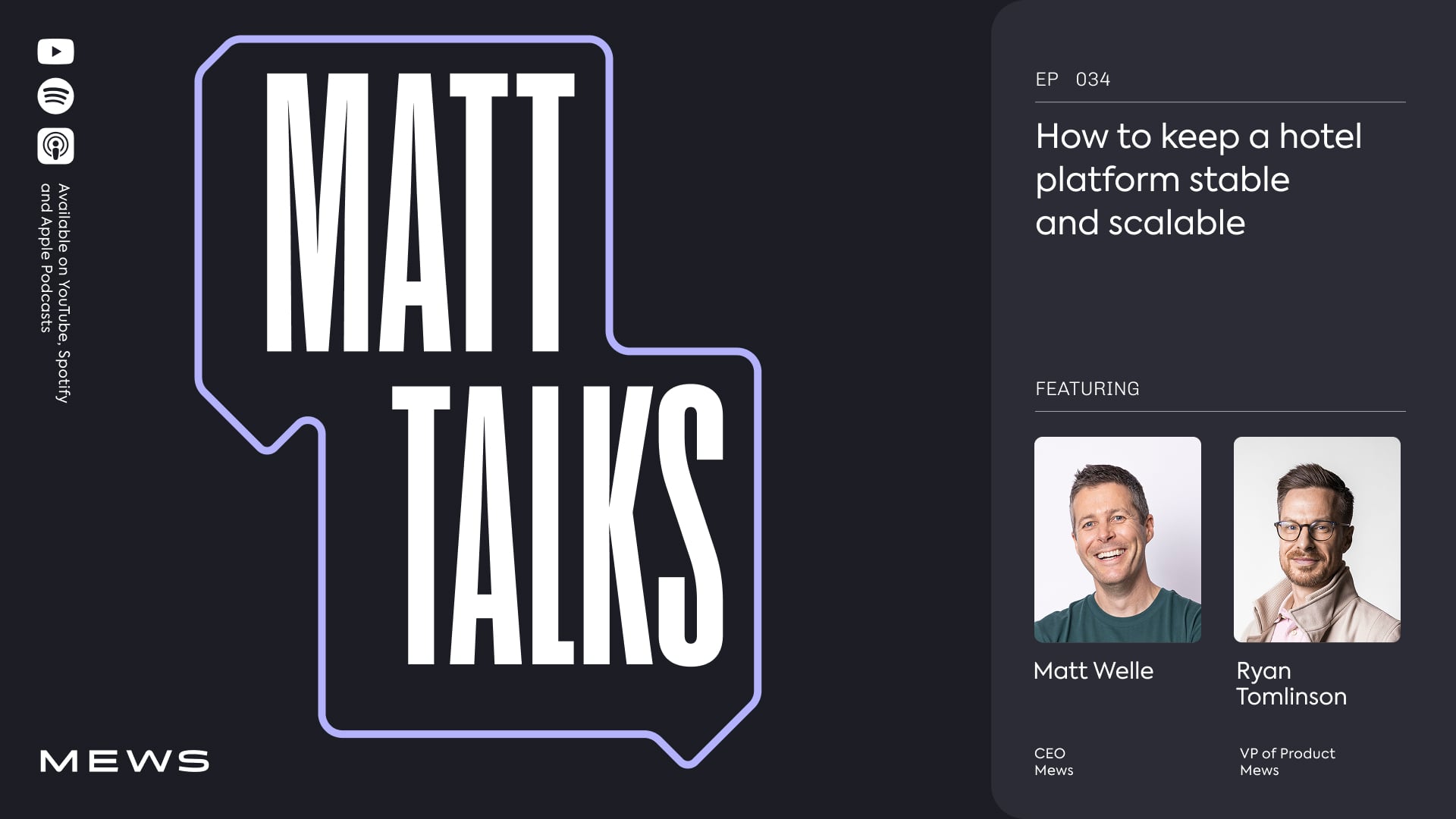What to expect?
Meet your speakers

Matthijs Welle
CEO, Mews
After years in the trenches of hospitality, Matt joined the Mews journey during its early days in 2013. Since then, he’s been our fearless CEO, leading the company and the industry forward.

Manisha Athukorala
VP of Deployment and Customer Success, Mews
Manisha Athukorala oversees product deployment and customer happiness at Mews. She has previously scaled teams and drove strategic business development in various tech companies.
Episode chapters
Transcript
Introduction
Hi, everyone. Welcome back to another Matt Talks. This week, I invited Manisha to join us to talk about what it takes to go live and to deploy Mews at your hotel, which is one of the hardest things to do, when you're running a business that never closes. Hotels are open twenty four seven every day of the year. So this is a hairy challenge and Manisha was brought into the company a couple eight months ago, I would say.
Go and help figure this out for us. Do you wanna maybe give a short intro as to your background? Because you're not a hotelier, but you've come from, like, a great background that actually makes sense for this particular role.
Yeah. Sure. So, no, I'm not from a hotelier, and I've actually worked across a number of different industries. So I, spent quite a bit of time in banking where I actually worked in an area called payments and cash management.
And so we were going into really big sort of fund managers and insurance firms and mapping out all of their payment flows and then automating them. So interestingly, quite a bit of a connection to what Mews does. And then I was really early in launching Uber Eats in Australia and then the US, for really sort of large enterprise clients. And I really went through the transformation of what it meant to have delivery at a restaurant.
And so a lot of the kind of, sort of tech disruption that we see hoteliers going through, we experienced in the restaurant sort of world. And my role there was to look at everything sort of post sales, so how we onboarded, how we manage those partnerships, sometimes how we built new products, for really large enterprise partnerships.
And then I did a bit of a one eighty, and I joined a health tech startup, and I built a fitness app from scratch. I was a GM. I was given a million dollars to go and build a concept, launch it, and then sell it to to customers. And today, we have about two thousand or three thousand users on this fitness app. So Wow. A really diverse background, of, like, product thinking, operational, and then, of course, like, always being sort of customer facing in some way.
And and when you entered hospitality, you are now a hotelier because you have joined our business and there's no they're never leaving this business. But what's the thing that really surprised you from our industry that that you thought was very different from what you'd seen before?
Yeah. I don't know if I was surprised.
I think it's what I see a lot where when you're on the outside, you think that these certain industries are much more sophisticated or much more technologically adept. So, for example, I used to be so shocked when we'd go to these big insurance firms and fund managers, and people are printing out and, like, highlighting to reconcile. And you think, that's crazy. How is this still happening?
And so I think I had a very similar kind of, sort of realization when I came into to Mews, and I sort of noticed that there's still a lot of manual work that's happening, and and sort of the the ability for tech to do so much more, like, whether it's automating or looking at the guest journey. Like, I think we're just really at the tip of the iceberg, and I, yeah, surprised is one way, but then not surprised because of the experience that I've had in the industries.
Chapter
Mews go-live process
And and when a customer buys Mews, we talk a lot about, oh, you know, going live with Mews. What does that journey look like if you would have to describe that to a hotelier who isn't sure what's about to hit them when they've signed that contract?
Yeah. Of course. So let's, like, talk about what it means to go live first. Right? Going live means that you're no longer using your previous PMS, and you're fully utilizing the Mews PMS. So everything from you're taking bookings, you're managing reservations, your payments are set up, your guest journey is set up, all of that, and and you're feeling very comfortable to be on Mews. So that's kind of the end goal.
But from contract signing, we do everything there is to make sure that you're set up in the best way possible. So, you sign your contract. There's some boring stuff around KYC, but very important.
We get your account set up, and then we're in what we call a configuration stage. So think of this as sort of setting everything up from your rooms. What are the descriptions? How do you wanna speak about them?
As well as spaces. Do you maybe have a bike rental that you want to put, on? We also look at things like your rates. And what's really interesting is it's a really good opportunity when you're making that PMS switch to also think about what your rate strategy is.
How are you thinking about discounting? Do you have special promotions?
We do your accounting categories. And then we really spend quite a bit of time defining what your guest journey is.
Again, another really, great opportunity to to think about what are my goals of my guest journey, and how can I utilize this change to really optimize what that is? So we have some hotels that come to us and say, I want it as automated as possible, you know, no touch. And then we have others who really want to think about the emails that they're sending, what that check-in and checkout experience looks like. So we'll have that all set up for you.
We then, simultaneously, we'll also do quite a bit of training. So training your team on not how to configure not just how to configure within news, but then also your front desk staff, how to utilize the system. So once that's all done, we then set up your configuration sorry, your integrations, making sure that those are all set in place. You're integrated with your channel manager.
We'll then have a really robust system audit, and that's really to make sure that we're we've set everything up in the best way possible, and that if there's anything missing, that we're we're taking care of that as well.
And then, oh, the last the other thing that I forgot to mention is also payments. That's really important. So making sure that your terminals have been sent out, they're set up, any payment automation is also put into place. And then once that's all done, you're ready to go live.
And usually on, when we go live, we have a few things that happen on that day, like reservation import. We have a checklist to make sure everything's going really smoothly, and then you're ready to go. And so that process can take really, it can go as quickly. Like, we've we've, been able to have people up and running within a week, or it can take months.
It really depends on what the goal is.
Average. Yeah.
The average is about two months.
Two months. Yeah. From the moment that you sign a contract to actually operating your entire hotel on Mews.
Yes. But I I'd say that the two months is maybe a little deceiving because often what will happen is there's sort of preconceived sort of ideas around how long it will take. And so then the hotelier will say, okay. Two months, three months. I'm gonna make my go live date this date, and we work backwards.
Whilst, like, as I mentioned, we Is there, like, a minimum period?
Because we can go as fast or as slow as the customer wants, but often there's a heavy lift on the customer side because you've gotta go through the training. You've gotta talk to your integration partners. But what's the fastest we can do?
We've done a week. So we can go in a week, and we we're seeing an average of, per certain clients, we can also do two weeks depending.
We can also go a lot faster if you're, let's say, a group hotel, and you've already set up your first, property, and then you want to take your second, third, or fourth. So it really depends on kind of the client and also how much preparation and time you put aside and then who the team is on your end that's helping you kind of put put all the dots together.
So, yeah, we're very flexible.
Chapter
The role of training
And and you mentioned training.
Is it like your typical classroom training where we fly someone in and we put all of them in a classroom and then we talk at them for eight hours? Or is there a different way that we approach training?
Yes. So, no, it isn't a classroom.
That's a leading question. I know the answer is, but go there.
I would say that our approach is actually quite flexible. So we have Mews University where you can go and log in, and there are courses that you can complete.
But we try to be also flexible to who the client is and how they believe that their staff is going to learn the best. So, things that we've been able to roll out before is train the trainer, making sure that we've trained one person or a few people who can then train the rest of the organization.
We highly encourage news champions, so those that really understand the system, and then they can be kind of a a knowledge base for, the internal staff. But I'd say the other part that I think is really interesting is that we built Mews in a way that's very intuitive, and so, certainly with our kind of front desk, staff, even if they haven't gone through all of the training, they're able to sort of catch on relatively quickly, which is really great. I I personally think that we can do more, with the with the way that we educate, because I think we need to be really aware of the way that people are learning now.
You know, I was reading an article the other day that said, you know, about fifty percent of Gen z actually learn on TikTok. And so if you think about what that means, right, that's thirty second videos that are quickly telling you how to do something. And so we're really responding to that change that we're seeing, and we're starting to adapt the way that we teach, thinking about more short form, thinking about how can you do So you're doing while you're learning.
And we're seeing a lot of success when we put some of those, learning modules up to test.
Nice. Yeah. I've been asking parents recently about the education of their children and whether they're comfortable actually uncomfortable with the way education is done in schools, but also that impacts how we do education in the workplace. And it is, you know, you and I, we think very deeply about how do we use AI and how do we rethink training. But a lot of people haven't really rethought this, but it's so critical because it's it's incredibly powerful. And especially with AI, a one on one mentor is a real possibility where someone could mentor you through your job and ask you all kinds of questions to kind of uncover things you didn't know before. And this is all about to change and it is really exciting if we get it right, but we can also really get it wrong, and we think deeply about how do we solve that.
Yeah. Exactly. And I I do think that, there are quite a few hoteliers who are starting to really think about how AI can be utilized. I was just speaking to someone on Friday who was saying that, yeah, they use AI to be able to help their staff get answers on different elements of news. So, yeah, I think we're really scratching the surface on what technology can do.
And and when like, the moment of, go live or when we onboard a customer, that's a real moment of change because they've most likely come from a legacy platform. And suddenly, they're in the cloud with all kinds of automation, and you talked about payments that were just automating.
And I've always felt a lot of resistance from hotels. I don't know if that's still the case. Do you still feel that people are resisting change because they're like, well, we've always done it like this. We should just continue doing that even with a new system? Or do you feel that people are really embracing the change and seeing that moment of go live as this moment in time when we're actually gonna look at all of the operating procedures in the hotel?
I think it's half half. So we see some folks that, view changing a PMS as, okay, I'm just taking what I did before, and now I'm moving it over here. And I think that is a fine way of approaching it, but it can also be very frustrating because the reality is is that our system is different. And if you're expecting it to be exactly the same, then that's not going to happen.
And so I'd say that that still that still occurs, and I don't think that that is the best experience. But we then have a lot of other hoteliers who are really taking that opportunity as, if I'm gonna make this change, then I'm also going to think about what else I can do. What are my other goals? Because there's a reason you're changing as well.
Right? There's a reason that you're deciding to move PMSs, and you might as well get the most out of it. Yeah. And and the ability to get the most out of it tends to happen in the way that you configure.
And what kind of goals would you talk about? Because I'm imagining most of them were like, well, my goal is to get the system live. But I'm like, that's not a great goal, but what would be a great goal?
Yeah.
Chapter
Setting goals for system switch
We see quite a bit. Right? There'll be goals around, I want to spend less time checking in and checking out. I wanna spend less time, reconciling billing, reconciling payments. So there is quite a, common goal around efficiency, that we see, and that's really great because then we can build towards that.
Another goal is often around just the guest journey.
What what am I trying to do? And and not just thinking about the PMS, but what do I want my, like, hotel lobby space to look like?
Yeah.
How do I wanna utilize it? And sometimes it's not about it's about what else you want to do. Right? If I wanna spend more time creating really fabulous experiences, then I need to spend less time maybe checking in and so on.
Yeah. We also see quite a lot around revenue goals. So utilizing unused spaces. Okay. What does that look like?
Being able to think about things like upsell. Where where does that make sense? Upgrades as well. And so really trying to kind of hone in on what aren't you doing that you could be doing, and how can a new system really allow that to happen?
So there there's quite a lot of different elements. I'd say also being really clear about where your pain points have been in the past.
We had an onboarding, just recently, actually, a a really great sort of luxury hotel in Scotland. And one of the things that they utilized was our automated emails that actually that we can send that shows what the location is because people were getting lost. And in the past, this was a really manual step.
And so I think when hoteliers come and really take a step back and think about, okay, what are our goals, but also what hasn't been working as well in the past? And now that we're moving to a new system, can we use this as an opportunity?
I think that's the best approach.
That's so good. What do you think, Hotelier's biggest fears are about changing out their system?
Everything going wrong.
I think, you know, seriously, I think that, firstly, did I make the right decision? It's a really big change. Right? And so hoteliers do worry about, you know, the guest experience. Is this gonna disrupt our guests? Is the changeover going to mean that we miss some reservations or rooms get mixed up?
There's quite a lot around also data getting lost in the transition and how that might affect their billing, their revenue, their invoices.
I'd say another sort of part of it is just the change management for their staff. It's learning a new system. How comfortable can, the staff get with utilizing the system? Will they sort of see disruption there? So I think, you know, really, not surprisingly, a lot of kind of the fears that are natural when it comes to changing something, which is why, open mind about change management and making sure that you're setting yourself up. And then we do quite a few things to, like, give give everyone a little bit of, ease and and sort of calm the nerves for sure.
How often does something actually go wrong? Because I things go wrong. We're humans that are dealing with humans on the other side, and things tend to, you know, most of the time go right. But how often does it actually go horribly wrong?
Sometimes. I can't I can't give you a percentage, but often when it does go wrong, it there's often a root cause as to why that's happened.
And we've learned from those moments. Right? So we have a really, clear checklist for go lives, and what needs to happen on that day. So an example is, if you don't make sure you update and look at the availability blocks that you have in place, then, yeah, someone can book in, when you're not available. If you don't go and reconcile, your room statuses, you know, where has housekeeping gone through, what rooms are occupied before that go live point. And if that's not done, then, yeah, you might check-in someone that is then sent to an occupied room.
So so the elements that tend to go wrong, we we kind of have reflected on and make sure that we're doing all the checks, to to get ahead of those.
So so those aren't as common if those checks checklists are followed.
There are sometimes kind of issues around reservation import where maybe the rates have been mismatched.
And so those are really good examples where, to your point, right, it's like, how do you prepare for when something goes wrong, and how do you deal with that? And so often, we'll have, we'll be right sort of on the phone with the client, making sure that if something goes wrong, we're very quickly troubleshooting, getting to the root cause, and fixing things. So I'd say, like, it's kind of prepping for both. How do you set up processes so that you reduce the risk of anything going wrong? And then how do you stay really nimble and agile if something does go wrong to be able to, you know, deal with it head on?
Chapter
How AI speeds up onboarding
And and, last week, I heard about this great example from Joris, who's in, the deployment team on the point of sales side, how he leveraged AI to make the onboarding a lot easier. Yeah. Can we share maybe what he did? And just as an example of how we're thinking about AI to help transform the way we do onboardings and and making sure that that data migration happens in the right way.
Yeah. It's it's a great example and, honestly, one that we can use for all of onboarding. So a lot of what we see is you you come into like, your configuration is often taking data from one place and putting it into another format.
And and that's where, like, a lot of the manual work happens. And so Joris, who's on our POS team, was looking at kind of the menu setup, which, you know, is in a very specific format, which we would take three hours or so to input it into this new format so that it speaks to our system. And what Joris was able to do was create a prompt to put that menu in through AI and, transform it into the the format that would then be uploaded within our system.
Nice.
And we're doing a lot of different experiments here in the same vein.
I was sitting with a product manager just two days ago. We were playing around with, how can we scrub the website of a hotel and then be able to understand or have that in the format of uploading room spaces and descriptions, which, to be honest, when we looked at it and compared, it was, like, ninety five percent accurate.
Yeah.
So really interesting. Right? Interestingly, initially, we were thinking that we would get that data from Booking dot com because the same things are set up.
And what we heard from Pateliers was that often the descriptions in Booking are are sort of preselected or they don't get as much Permogenized.
Yeah.
Yes. Exactly. And so then we thought, okay. Well, that's maybe not the best place. The website is likely where the description matches what the hotelier is really wanting to describe. So if we could scrub that, does that get us to to sort of utilize that in the format that we needed?
And you can even take that further.
You so I was building a bot this weekend, just to see if I could build a bot. And I said scrape all the reviews of Tripadvisor Yeah. To see what are the most common topics that customers cared about. And you could almost use Tripadvisor and all these online platforms as what's what are the elements that I I should have in my room descriptions that best describe the experience that guests are excited excitedly talking about online.
Yeah. I love that. For sure. I mean, there's so much that we can do. One of the other things that we're looking at is, the reality is, like, a lot of hoteliers are speaking to Mews for quite a while before they come to onboarding. Right? And so they've already shared a lot of information about the hotel.
We they've spoken about their goals. And then often what we'll do is we'll ask them all over. Again.
All that happens sometimes is the person that has bought Mews or signed off on Mews isn't necessarily the same person that's now deploying Mews. And so even within the hotel, there's, like, an information transfer, that gets lost. And so right now, we're we're we're saying, well, we have all of the recordings of our calls. Could we scrape them and use utilize them to be able to already know what the goals are? And then maybe even set up the system in you know, to to suit those goals. So, yeah, the world's our oyster when it comes to AI.
What does success look like if if a customer goes live and you're like, if they do these things, this is what a successful onboarding looks like?
Okay. Yeah. I mean, firstly, right? Yeah. You've gone live. There's no issues. Nothing bad has happened.
You're taking reservations. Your guest journey hasn't been disrupted. I think that that's just the base level of success. That's like, of course, that's a nonnegotiable.
Yeah. I think what real success looks like is that you're better off. You've moved PMS systems. You've taken the opportunity to really strategically think about what you want to change, and you're configured in that way.
And when I mean that you're better off, it means that you're saving time, whether it's check-in, check out, any of those admin sort of functions. You're starting to see revenue growth, whether it's because you've got up upsells or you've got different spaces. Maybe you've cleaned up your rates in a way that also drives that revenue growth as well. I think then also where your staff are really bought in and they're really excited about the change because you've not just invested in training them, but you've also invested in the change management that occurs in an internal perspective to get staff excited.
And then also that it's not the end of that kind of configuration phase with news, that you're, still providing feedback, you're iterating, and you're problem solving. And I think being able to continue to do that and not just see, okay. Well, I've gone live. Yeah.
It is what it is. Maybe I'm a little annoyed about this particular configuration, but I'm just gonna let it be. No. It's to say, okay.
Actually, that's not quite right, or we've started using the system and we've seen this. How can we make it better? And I think that is also what success looks like.
Because often when we come in as the PMS, they hotel might not wanna change all of their integration partners. So we come in and an average hotel has, like, seven integration partners. And they might not wanna do all that at the same time. But once the PMS is live, that is not the moment to stop the innovation because actually what you had before integrated might not be the best set of integrations.
And this is where we can help advise through our customer success org to saying, if you're looking to drive revenue, potentially look at these marketplace partners that we can deploy. And I think that's why you own both deployment, but also the the journey afterwards, which we call customer success. And the name kind of says it all. We want our customers to succeed.
Yeah. I think that that's so important. I think the other part is that, like, we can advise all we want, but the reality is is, like, you as a hotelier, you know your business the best. We knew moo we know Mews.
And, you know, at deployment is kinda a convergence of what do you know within your hotel? What do we know about news? And so we try our best to say, okay. How did these two things coming together create, like, the best experience?
But the reality is is, like, when you start using the system, you're gonna notice things that maybe could be improved, or maybe there is something that you don't even realize that could be an opportunity. And I think that, like, just being realistic, that's a journey. And so being able to, like, continue to work on that once you're using the system, I think, is really, really important versus trying to perfect it and say, okay. Well, you know, it's gonna be perfect once we deploy, and then that that's it. The work is done. I don't I don't I don't think that's realistic. And I think taking that attitude, actually, you end up losing quite a bit of opportunity to continue to iterate and continue to improve.
Chapter
The ideal Mews customer
Yeah. And and if you had a choice, like, who's the perfect customer? Like, you know, obviously, we know what customers want from us, but it is a two way street. And Yes. What does a perfect customer look like?
The perfect customer. I think one that's really prepared and engaged.
Like, again, it's not just about saying you want to change, but really being engaged and excited about that change.
Often, it will be customers that have maybe allocated someone specifically to run the project. Or if you're an independent hotel, you've carved out the time, really intentionally, because we get it. Everybody's really busy, but making sure you've made the time to to invest.
I think also those that, approach kind of the the transition with a really open mind. So how can I do more? How can I innovate? How can I be you know, it's not going to look exactly the same, and I'm okay with that as long as I understand what the value is? So having that openness, that desire to innovate.
I think also, customers that are really collaborative and open with us. We're all I love when we get direct feedback. You know, I'd rather know when someone's not happy than them keeping it to themselves and being, like, slightly annoyed that it builds up. So we're here to help and making sure that we have that really kind of open collaboration with each other. Yeah, I'd say it's kind of those three things.
And then I'd say the last that no system is perfect.
I think that's one of those things as well that we have to acknowledge that whilst we have a huge R & D team that constantly builds features out, we will never be the perfect solution for any hotel. There's always something that you want. And as long as you are aware of that, as you sign the contract, as you go through the onboarding with us and and you've done your due diligence and you understand what the limitations are, then we can help you find a workaround. But if you are saying, I must have this thing, then do the due diligence beforehand to really deeply understand that we might not tick that box for you, and that's okay as well. At some point in the future, we might come back to you and then deploy, but really do that work upfront. And don't get to that realization as you're deploying because that basically is the job of the the customer to do beforehand.
Yeah. I agree. I think also being solutions orientated. Right?
So rather than saying, oh, I want this. Why don't you have it?
Well, why do I want this? What's the outcome that it was, you know, driving before?
Yeah.
And how can I, again, have a similar outcome or have it a better outcome? And that, I think, that sort of being able to problem solve together is really key because, what I'll say is a testament to to our team is that we're really open to say, okay. You wanna accomplish this. Maybe it isn't exactly the way that you did it before, but let's find what a solution could be.
And like you mentioned, there's integration partners. There's so much now you can do with AI that we have, you know, technical account managers that are on staff. There's there's always a way that we can get to an outcome. So I think that's also a a distinction that I would know.
And my last question is, what's next? What's the thing that really excites you that you know is coming that you are allowed to talk about?
How can I say this? Okay. So I ever since I started, everyone would really talk about deployment or onboarding a PMS, as being very similar to heart surgery.
You know, it's like triple bypass. You're spending hours on the surgery table, it's like six to twelve weeks of recovery. It sounds really painful, and I would like to kind of think about how can we go from you going to a hospital thinking you need a bypass to you get, like, a stent replacement? And it's a little incision on your wrist.
It only takes thirty to sixty minutes. You're up and running within a day or two, and your heart's better for it, you know, and everything is still running really well. And so I think, like, when you think about innovation in how you do something, I think that's a really great analogy of what I'm hoping that we can accomplish with deployment. So, you know, hopefully not making it two months long, having less that we need our sort of hoteliers to do so they can spend more time being strategic, really thinking about the change management element.
So automating things, using AI, making it all much more intuitive.
So maybe we can stop using this analogy of art search.
I loved having you. And and and it's crazy that you've only been with us for eight months and it feels like you've been with us for years and you've absorbed our industry so much, but it shows how deeply you care about getting these deployments. Right? So, thank you. Keep doing this amazing work and I'm excited to hopefully have you back in a year's time to talk about the transformation that you've brought in a year's time from today.
Yes. Well, thank you for having me.
Nice. Thanks.



